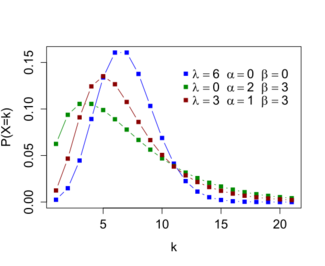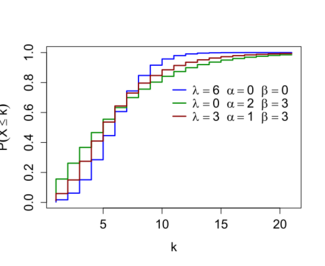Delaporte distribution
|
Probability mass function  When [math]\displaystyle{ \alpha }[/math] and [math]\displaystyle{ \beta }[/math] are 0, the distribution is the Poisson. When [math]\displaystyle{ \lambda }[/math] is 0, the distribution is the negative binomial. | |||
|
Cumulative distribution function  When [math]\displaystyle{ \alpha }[/math] and [math]\displaystyle{ \beta }[/math] are 0, the distribution is the Poisson. When [math]\displaystyle{ \lambda }[/math] is 0, the distribution is the negative binomial. | |||
| Parameters |
[math]\displaystyle{ \lambda \gt 0 }[/math] (fixed mean) [math]\displaystyle{ \alpha, \beta \gt 0 }[/math] (parameters of variable mean) | ||
|---|---|---|---|
| Support | [math]\displaystyle{ k \in \{0, 1, 2, \ldots\} }[/math] | ||
| pmf | [math]\displaystyle{ \sum_{i=0}^k\frac{\Gamma(\alpha + i)\beta^i\lambda^{k-i}e^{-\lambda}}{\Gamma(\alpha)i!(1+\beta)^{\alpha+i}(k-i)!} }[/math] | ||
| CDF | [math]\displaystyle{ \sum_{j=0}^k\sum_{i=0}^j\frac{\Gamma(\alpha + i)\beta^i\lambda^{j-i}e^{-\lambda}}{\Gamma(\alpha)i!(1+\beta)^{\alpha+i}(j-i)!} }[/math] | ||
| Mean | [math]\displaystyle{ \lambda + \alpha\beta }[/math] | ||
| Mode | [math]\displaystyle{ \begin{cases}z, z+1 & \{z \in \mathbb{Z}\}:\; z = (\alpha-1)\beta+\lambda\\ \lfloor z \rfloor & \textrm{otherwise}\end{cases} }[/math] | ||
| Variance | [math]\displaystyle{ \lambda + \alpha\beta(1+\beta) }[/math] | ||
| Skewness | See #Properties | ||
| Kurtosis | See #Properties | ||
| MGF | [math]\displaystyle{ \frac{e^{\lambda(e^{t}-1)}}{(1-\beta(e^{t}-1))^\alpha} }[/math] | ||
The Delaporte distribution is a discrete probability distribution that has received attention in actuarial science.[1][2] It can be defined using the convolution of a negative binomial distribution with a Poisson distribution.[2] Just as the negative binomial distribution can be viewed as a Poisson distribution where the mean parameter is itself a random variable with a gamma distribution, the Delaporte distribution can be viewed as a compound distribution based on a Poisson distribution, where there are two components to the mean parameter: a fixed component, which has the [math]\displaystyle{ \lambda }[/math] parameter, and a gamma-distributed variable component, which has the [math]\displaystyle{ \alpha }[/math] and [math]\displaystyle{ \beta }[/math] parameters.[3] The distribution is named for Pierre Delaporte, who analyzed it in relation to automobile accident claim counts in 1959,[4] although it appeared in a different form as early as 1934 in a paper by Rolf von Lüders,[5] where it was called the Formel II distribution.[2]
Properties
The skewness of the Delaporte distribution is:
[math]\displaystyle{ \frac{\lambda + \alpha\beta(1+3\beta+2\beta^2)}{\left(\lambda + \alpha\beta(1+\beta)\right)^{\frac{3}{2}}} }[/math]
The excess kurtosis of the distribution is:
[math]\displaystyle{ \frac{\lambda+3\lambda^2+\alpha\beta(1+6\lambda+6\lambda\beta+7\beta+12\beta^2+6\beta^3+3\alpha\beta+6\alpha\beta^2+3\alpha\beta^3)}{\left(\lambda + \alpha\beta(1+\beta)\right)^2} }[/math]
References
- ↑ Panjer, Harry H. (2006). "Discrete Parametric Distributions". in Teugels, Jozef L.; Sundt, Bjørn. Encyclopedia of Actuarial Science. John Wiley & Sons. doi:10.1002/9780470012505.tad027. ISBN 978-0-470-01250-5.
- ↑ 2.0 2.1 2.2 Johnson, Norman Lloyd; Kemp, Adrienne W.; Kotz, Samuel (2005). Univariate discrete distributions (Third ed.). John Wiley & Sons. pp. 241–242. ISBN 978-0-471-27246-5.
- ↑ Vose, David (2008). Risk analysis: a quantitative guide (Third, illustrated ed.). John Wiley & Sons. pp. 618–619. ISBN 978-0-470-51284-5.
- ↑ Delaporte, Pierre J. (1960). "Quelques problèmes de statistiques mathématiques poses par l'Assurance Automobile et le Bonus pour non sinistre" (in French). Bulletin Trimestriel de l'Institut des Actuaires Français 227: 87–102.
- ↑ von Lüders, Rolf (1934). "Die Statistik der seltenen Ereignisse" (in German). Biometrika 26 (1–2): 108–128. doi:10.1093/biomet/26.1-2.108.
Further reading
- Murat, M.; Szynal, D. (1998). "On moments of counting distributions satisfying the k'th-order recursion and their compound distributions". Journal of Mathematical Sciences 92 (4): 4038–4043. doi:10.1007/BF02432340.
External links
 |

